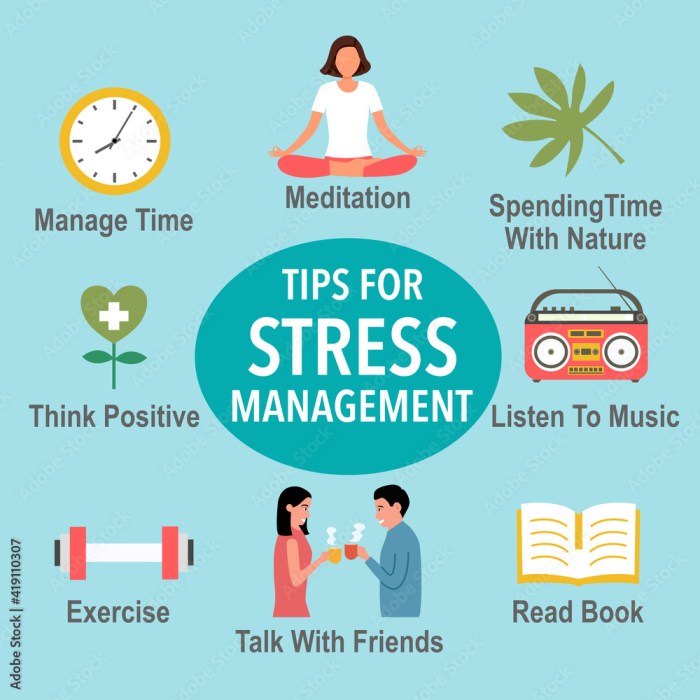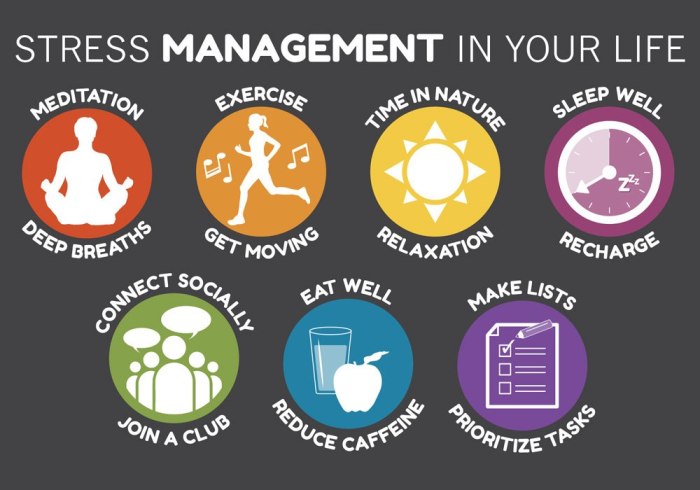Stress Management Tips: Enhancing Well-being and Productivity kicks off with a bang, diving into the world of stress management techniques that can revolutionize your daily life. From relaxation methods to coping strategies, get ready to master the art of stress management like a pro.
Get ready to discover the ultimate guide to conquering stress and boosting your overall wellness.
Benefits of Stress Management
Stress management is crucial for maintaining a healthy lifestyle, both mentally and physically. By effectively managing stress, individuals can experience a range of benefits that contribute to overall well-being and quality of life.
Improved Mental Health
- Reduced anxiety and depression levels
- Enhanced focus and concentration
- Improved mood and emotional stability
Enhanced Physical Health
- Lowered blood pressure and reduced risk of heart disease
- Boosted immune system function
- Decreased muscle tension and chronic pain
Increased Productivity
- Ability to prioritize tasks and manage time effectively
- Enhanced problem-solving skills and decision-making abilities
- Improved creativity and innovation in work
Stronger Relationships
- Improved communication and conflict resolution skills
- Enhanced empathy and understanding towards others
- Increased patience and tolerance in interpersonal interactions
Stress Management Techniques
In today’s fast-paced world, stress has become a common issue affecting many individuals. However, there are various techniques that can help manage stress effectively.
Relaxation Techniques
- Deep Breathing: Taking slow, deep breaths can help calm the mind and body, reducing stress levels. Inhale deeply through your nose, hold for a few seconds, and exhale slowly through your mouth.
- Meditation: Practicing meditation regularly can help improve focus, reduce anxiety, and promote relaxation. Find a quiet place, sit comfortably, and focus on your breath or a calming mantra.
- Progressive Muscle Relaxation: This technique involves tensing and then relaxing each muscle group in the body, helping to release physical tension and promote relaxation.
Benefits of Regular Exercise
Regular exercise is not only beneficial for physical health but also plays a crucial role in managing stress effectively. Engaging in physical activity releases endorphins, also known as “feel-good” hormones, which help reduce stress and improve mood.
Time Management and Prioritization Tips
- Make a to-do list: Writing down tasks can help you organize your day and prioritize effectively.
- Set realistic goals: Break down tasks into smaller, achievable goals to prevent feeling overwhelmed.
- Avoid multitasking: Focus on one task at a time to improve efficiency and reduce stress.
- Take breaks: Allow yourself short breaks between tasks to recharge and prevent burnout.
Healthy Lifestyle Choices: Stress Management Tips

Maintaining a healthy lifestyle is crucial for managing stress effectively. By making the right choices in terms of nutrition, sleep, and mindfulness practices, you can significantly reduce stress levels and improve your overall well-being.
The Impact of Nutrition on Stress Levels
Eating a well-balanced diet plays a key role in managing stress. Foods rich in vitamins, minerals, and antioxidants can help regulate stress hormones and promote a sense of calm. Incorporate plenty of fruits, vegetables, whole grains, lean proteins, and healthy fats into your meals for optimal stress management.
Getting Enough Sleep for Stress Reduction
Quality sleep is essential for combating stress and maintaining mental clarity. Aim for 7-9 hours of uninterrupted sleep each night to allow your body and mind to recharge. Create a relaxing bedtime routine, such as reading or listening to calming music, to improve the quality of your sleep and reduce stress levels.
Incorporating Mindfulness Practices for Stress Relief
Mindfulness practices, such as meditation, deep breathing exercises, and yoga, can help you stay present and calm in the face of stress. Take a few minutes each day to practice mindfulness and focus on the present moment. This can help reduce anxiety, improve concentration, and enhance overall resilience to stressors.
Coping Strategies for Stressful Situations

When faced with stressful situations, it’s important to have effective coping strategies in place to help manage and reduce stress levels. Here are some tips to help you navigate through challenging times:
Seeking Social Support
Connecting with friends, family, or a support group can provide emotional comfort and validation during stressful times. By sharing your feelings and experiences with others, you can gain new perspectives and insights that may help alleviate stress.
Engaging in Hobbies and Creative Outlets, Stress Management Tips
Exploring hobbies, interests, or creative outlets can serve as a distraction from stress and promote relaxation. Whether it’s painting, gardening, playing a musical instrument, or engaging in sports, finding activities that bring you joy and fulfillment can help reduce stress levels and improve overall well-being.